Mathematics at John Scurr
“Mathematics is not about numbers, equations, computations, or algorithms: it is about understanding..”
William Paul Thurston
Intent
At John Scurr we provide the children with a rich and balanced mathematics curriculum that develops their fluency, reasoning and problem solving – the key aims of the National Curriculum for mathematics. We strive to ensure that all children achieve high standards in mathematics and develop positive attitudes to the subject.
Maths at John School is presented as an engaging, interconnected subject that promotes a confident attitude in tackling mathematical challenges and encourages children to become creative, confident learners. We intend the children to see mathematics as relevant to their world and applicable to everyday life as well as being something that they will need as they move on through their school life and ultimately to the world of employment.
We plan, teach and assess to enable children to:
- develop positive attitudes to mathematics, recognising that mathematics can be both useful and enjoyable.
- develop and embed their conceptual understanding of mathematical ideas
- become fluent (develop automaticity) in the fundamentals of maths through varied practice
- recall and apply their knowledge rapidly
- reason and problem solve by applying their mathematics to a variety of increasingly complex problems
- build on prior mathematical knowledge and understanding
- develop as independent learners who are expect to be challenge and respond to challenge with resilience and resourceful
- look for connections between mathematical ideas.
- use and apply their mathematical skills in other curricular areas.
- express themselves and their ideas using the language of mathematics confidently
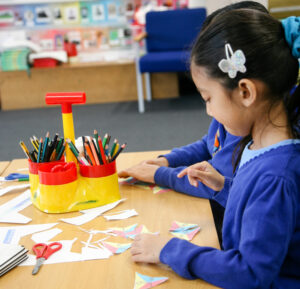
How Do Pupils Learn
As a school we recognise the importance of on going professional development. We plan and teach mathematics using and applying current pedagogic ideas relating to: Mathematical Mastery, Cognitive Learning Theory and Metacognition to maximise our children’s learning.
Curriculum overview and block planning documents from White Rose Maths (https://whiterosemaths.com) are used to ensure we have a well-constructed, progressive curriculum. These planning resources are supplemented and customised to meet the needs of classes, groups and individual children. Daily lessons include fluency, reasoning and problem solving to provide opportunities for intelligent practice and challenge for all children. Pupils have daily opportunities to retrieve and practise previous learning. They are also provided with regular opportunities to explore more open-ended, richer mathematical investigations such as those provided by Nrich (https://nrich.maths.org).
In keeping with a mastery approach all children in a class explore the same mathematical ideas at the same time. However teachers differentiate tasks in order to meet the needs of all children. Learners are challenged to stretch themselves and take risks in their learning. In addition, children are given regular opportunities to practise key number and arithmetic skills, including rapid recall (including times tables) and efficient mental and written methods of calculation.
Manipulatives (such as Base 10) and pictorial representations (including bar models) are used consistently across year groups to support conceptual understanding and make explicit links between mathematical ideas for all children
In every classroom, resources such as number lines, hundred squares, place value charts and multiplication squares, models and images are used for whole class or individual work. Working wall displays in classrooms support long-term memory, scaffold learning, promote maths thinking and celebrate learning.
Children are provided with opportunities to learn independently, with a partner, in groups and as a class. Smaller cusp groups are used in each year group to support those children who need additional support for identified areas of the curriculum, or who have gaps in their knowledge which need to be addressed. These groups are fluid and change according to the needs of the individual children and their year groups. Weekly after school “Readiness” maths sessions are also provided for children who would benefit from opportunities to revisit the maths they have been learning about during the week, or to practise basic maths skills, such as number bonds and times table facts.
In Early Years the child centred approach embedded in best practice outlined in Development Matters is followed. The Mastering Number programme provided by NCETM is used in Reception and Key Stage 1. Mathletics and Times Table Rockstars online programmes are used to support maths learning both in school and at home.
Talk and Discussion
Teachers at John Scurr understand the importance pupils’ oral contributions and ensure that all children feel they can contribute. Mathematical vocabulary is displayed and modelled. Key questions and sentence starters are used across the school. Children develop their mathematical understanding through discussion.
Cross-Curricular Links
Cross-curricular opportunities to practise, apply and develop mathematical understanding are provided across the curriculum. Science planning and teaching includes maths topics to practise and develop. Opportunities are taken to contextualise mathematical learning by linking it to the wider curriculum during maths lessons. Money week provides a meaningful cross-curricular opportunity to link maths, P4C and PHSE. An annual Money Fair is organised and led by the children.
It enables children to develop teamwork and work with pupils from different year groups. John Scurr has a well-established relationship with the organisation Number Partners. Volunteers from The City of London visit each week and play maths games with children.
The children at John Scurr enjoy maths. The Mathletics (https://login.mathletics.com) and Times Tables Rockstars (https://play.ttrockstars.com/auth/school/student/11254) computer programmes are motivational, help make learning memorable and support the children’s learning beyond school into the home.
Support
Additional support is given to children who need it to enable them access the maths curriculum. Intervention groups are adapted to the needs of the children and may take place during maths lessons or in addition to them. Sessions are delivered by a teacher or teaching assistant and involve individual or small groups working together. Such groups are always fluid.Maths at Home
Maths in the wider world
John Scurr has a well-established relationship with the organisation Number Partners. Volunteers from The City of London visit each week and play maths games with children. The children also get an opportunity to see how maths can be helpful in the world of work when they visit Lloyd’s of London.
Money week provides a meaningful cross-curricular opportunity to link maths, P4C and PHSE.
The annual Money Fair is organised and led by the children. It enables children to develop teamwork and work with pupils from different year groups. The Tower Hamlets Year 6 Maths Competition stretches confident mathematicians.
Parents and Families and Maths
At John Scurr the importance of the relationship between home and school is understood. Parents are encouraged to get involved in their children’s mathematical learning. Termly, parents and carers are invited to attend their children’s maths lessons to help them understand how maths is taught.
Maths homework provides opportunities for children to practise and consolidate their skills and knowledge, and to share their mathematical work with their family.
Impact
The children at John Scurr have a broad, rich mathematical curriculum, which enables them to achieve results in line with national expectations at the end of key stages.
The needs of all children including disadvantaged pupils and pupils with SEND are understood – planning, teaching and assessment enable all children to experience success and make progress with their learning. The successes of all children are celebrated. A Growth Mindset approach is strongly promoted. Children are highly motivated and enjoy maths.
Children apply cross-curricular skills and knowledge to support their mathematical learning. They are able to predict, clarify, question, summarise, visualise and reason to develop their mathematical understanding and problem solving. They understand that these skills are useful across the primary curriculum. Children discuss with increasing confidence their mathematical reasoning and problem solving strategies using appropriate mathematical language.
Teachers check pupils’ understanding effectively, identify misunderstandings and adapt their daily planning and teaching accordingly. Common errors become teaching points either in main maths lessons or in Number skills sessions. The school’s marking policy supports this approach. White Rose end of block and termly assessments, and Mathletics assigned activities are used to assess coverage and understanding. The outcomes of these assessments inform planning and teaching to ensure that learning is secure and embedded.
Children’s progress is tracked each term using the school tracker. Year group, and cluster schools’ moderation, book looks and teaching and learning reviews ensure consistency in assessment. Reviews of science and other curriculum areas demonstrate the impact of mathematical teaching and learning at John Scurr – children use and apply their mathematical learning confidently across the primary curriculum.
Year Group area of study:
EYFS: The learning objectives detailed in Development Matters are taught throughout the year, following a child centred approach in Nursery and Reception. In addition, the Mastering Number programme provided by NCETM is used in Reception.
Year 1:
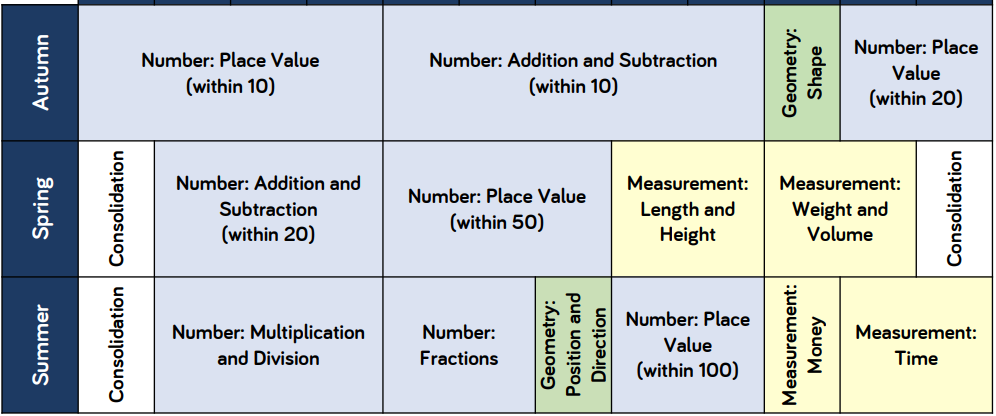
Year 2:
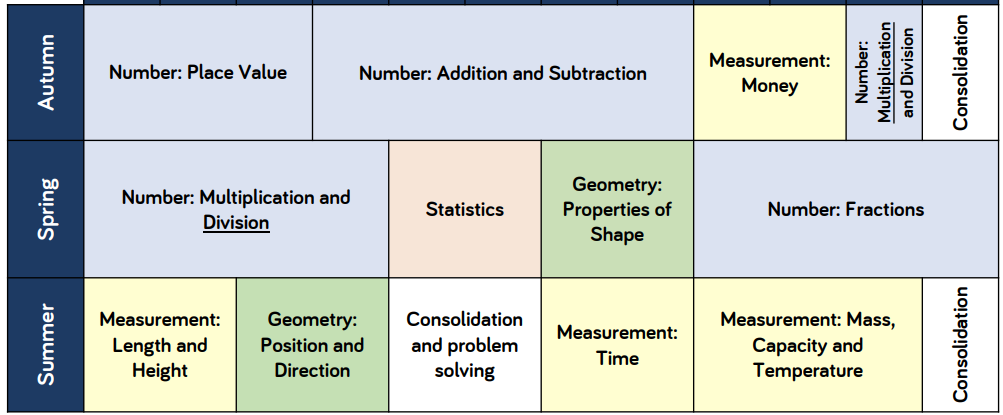
Year 3:
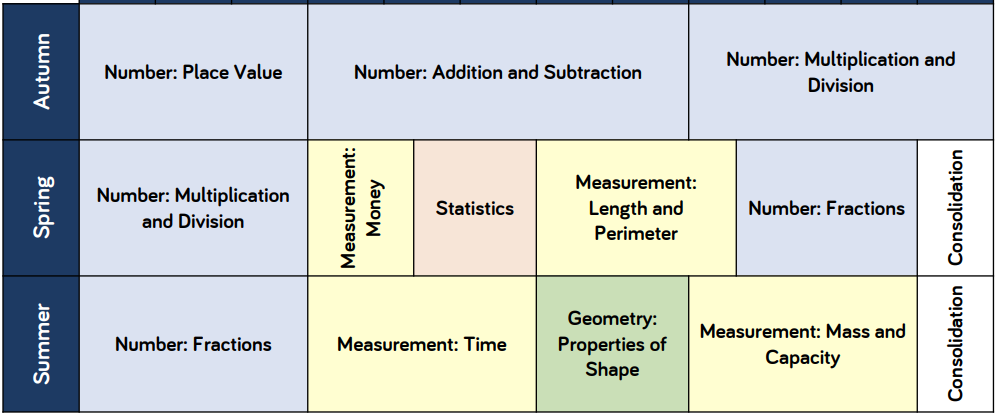
Year 4:
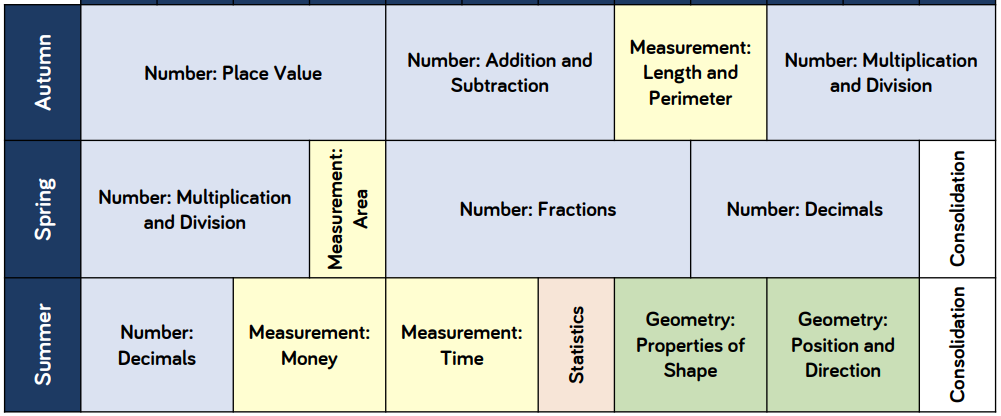
Year 5:

Year 6:
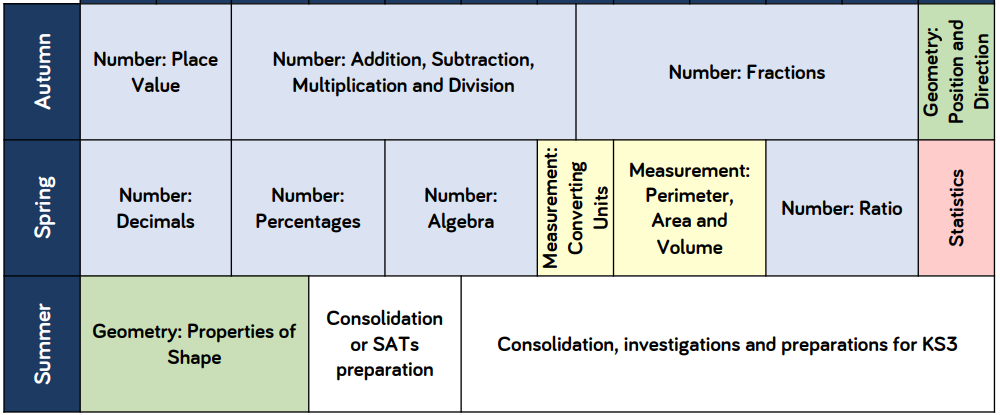
How do we know what the children have learned?
- Questioning
- Daily retrieval practice
- End of Block assessments
- Talking to teachers
- Star maths screening( from Sept 2022)
- Pupil Book Study
- Feedback and marking
- Progress in book matches the curriculum intent
- End of Key Stage statutory assessments
- Mathletics and TTRS
- moderation amongst local schools